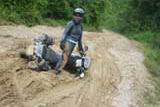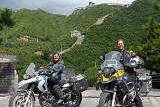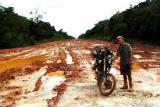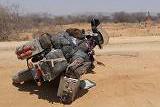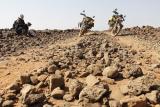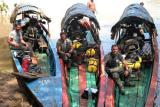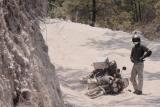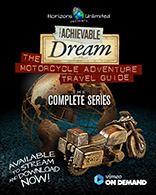-
...the skyline of Cartagena emerged on the horizon in the early afternoon. South America beckoned to us! For most of the passengers it was the first time on this continent. The Stahlratte anchored down a few hundred meters away from the shores of Manga Island, where the Aduana offices were located. Because it was expensive to rent a commercial pier to off load the bikes, we used a small public pier and dinghied the bikes to shore. It was a wild process to get the bikes on land and it's a testament to the crew's experience that we timed the off load to coincide with high tide...
Gene and Neda, 'Lightcycle' from Toronto, RTW, in Colombia, R1200GS and F800GS,
-
"After a couple of hours the roads got worse and the riding got harder. Roadworks after roadworks didn't aid our speed, but the 'making good' of the road suddenly ceased at what appeared to be the worst bit. Rough crevices across the road, rocky outcrops to navigate, and then mud, mud, mud everywhere were to be the order of the day.
Thank God we had not tried to make this treacherous and exhausting journey in the short afternoon of the day before! Not to mention the other 'dangers of the road' that we had been told about, coming in the forms of armed drug gangs hanging about in the dense jungle-shrouded mountains. I don't care if I need a pee! I'm not going in there! Thankfully we didn't see any of those undesirables, but we did get stuck in a lot of mud!"
Chris and Chloe Granger, UK, in Honduras
-
"As the dusty day descended into dusk we came upon a perfect road, lined by lovely vegetation and with very few trucks. As we found out later, we had entered the county of Beijing where everything is beautifully well kept as the nation's capital. Then a few kilometres later, riding a lovely curvy road in the mountains we could make out a wall perched on a hilltop. Spotlights were lighting the wall and it made for a fantastic sight. The Great Wall of China.
We had actually ridden our motorcycles all the way from Germany to the Great Wall of China. We had to pinch ourselves to confirm that we weren't dreaming."
Ekke and Audrey Kok, Canada, in China
-
"We had filled up with petrol and were ready for 500km of jungle. Or so we thought. After 100km and a couple of these ferries, we passed an army base, the last of civilization for awhile. No private contractors were willing to rebuild the BR 319, so the army was sent in to do it. The road was originally built to maintain the communication towers every 50 or so km that connect Manaus to the rest of the country. It had not been maintained since the 80's. At the time the 10-15km after the army base was the worst part of the road.
We had to repeatedly unload as we sunk stuck into mud up to the bottom of the bags, push the bike through and reload. After valiantly battling through 8km of mud in 2+ hours, the bike decided to completely consume her clutch..."
Chad and Kyla, NZ, 2-up on a Chinese 250 in the Brasilian jungle
-
"The road wound and twisted and doubled back on itself forever climbing. I rode through lush palm forests and skirted along the sides of mountains. The road was treacherous to say the least and had broken away in several places.
I was out there on my own, no cars or vans dared this road. At least I didn't meet any. I only met locals on motorcycles, though bigger than mine and with lovely telescopic front suspension with several inches of travel.
Hill climbs were especially difficult made worse by the heavily broken rock road and having so much weight over the front wheel which served to add weight and worse still momentum into the steering and made it difficult to control as the wheel bounded against rock and stones."
Seán Patrick Dillon, Ireland, in Guatemala, Honda Cub
-
"...the rear wheel slid out from under me. Before I knew it, I was 'here' and the bike was a few feet over 'there'. The right pannier was stripped from the bike and mangled up pretty badly. I would not be able to remount it to the bike until it was fixed - Argh! It was close to 120-degrees with no shade in sight. I was four hours away from Lodwar, the next town and my destination.
Twenty minutes later a truck stopped. Luckily the truck needed to change a shredded tire. Out of the cab came three men and an armed Askari carrying an AK-47. The men helped me get the bike to the side of the road. They too were going to Lodwar on their way to Sudan. They offered to haul the wounded pannier into town for me and drop it off at the local gas station. Meanwhile, a herd of camels passed through and the two herdsmen stopped to talk with the men from the truck. The younger herdsman also carried a Kalashnikov and compared ammo clips with the guard of the truck - I was beginning to feel a bit inadequate with just my Leatherman..."
Mike Lewis, USA, in Kenya
-
"From Isiolo to Moyale at the border to Ethiopia is one of the most challenging and feared roads by all travellers doing a Cape to Cairo trip due to a very bad gravel road and reports of bandits in the area. This stretch of 260 km gravel presented to us - rocks (many!), sandy patches, desolate desert scenes, even green valleys with trees, camels, donkeys, a jackal, bushbaby, mud and even some rain! The terrain is really harsh and we marvel at the fact that people can survive in this area. We managed to successfully complete this section in three days and the bikes survived the battering with only one flat tyre along the way. Nevertheless I was very relieved when we finally crossed the border into Ethiopia."
Tania and Francois Steyn, South Africa, in Kenya, 200cc Motomia road bikes
-
"Three skiffs were nosed up to the bank, engines still running to keep them together and in place against the strong current. We unload all our gear, then Wade takes the plunge and rides down the muddy bank first. It takes 5 guys to man handle Smokey onto the boat. Half and hour later, Aialik and Kev's bike are tied down. We are ready to go! It doesn't look right. It doesn't feel right. The bike makes the boat look tiny, and how the centre of gravity is low enough to prevent capsizing neither Wade nor I have a clue. Our little boats gingerly pull off the bank. Everyone, including the drivers hold their breath. They are looking pale, palms sweaty. I am happy to see Wade's boat backing out first. As it floats off, everyone sucks in a long overdue lung full of air. We just might make it after all!"
Wade Stubbs and Philip Atkinson, Australia, crossing from Mexico to Guatemala by boat
-
"Honestly, we started to doubt whether we should go south into Mexico after all the warnings! Someone really asked us whether we would carry a gun on the bikes, and if not, we should definitely not drive into 'scary Mexico'! The prediction by most people was that we would be shot, raped, murdered and robbed within the first week. Now that we are in Mexico for just over six weeks, I think we owe the Mexican people, country and wonderful hospitality this story; this country is great and the people are even better! To whomever is in doubt: get your ass on the bike and drive up here! ."
Daan Stehouwer and Mirjam van Immerzeel, Netherlands, in Mexico
-
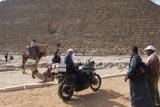
"...Top tip for anyone travelling to Cairo: Do as the locals do, and let Allah guide you through the maelstrom. Alternatively, leave your bike at home. I'd heard all the stories, but had taken them with a pinch of salt. But the locals are maniacs - I've never seen such poor driving. As long as your horn works, you have a right to the smallest of gaps. Even if your car doesn't look big enough for the space, you have to fill it, otherwise someone else will. The badly-maintained pick-ups that act as buses, and the minibuses, coaches and lorries are seemingly all out to kill you, and even if there are only two lanes painted on the road, it doesn't really mean two, it means four, and sometimes five if there's enough space. And the horn isn't used aggressively in general, it's more of an 'I'm here' beep, or an 'I'm coming through' indication. And just because you're on the correct side of the road doesn't mean you won't meet someone coming the opposite way straight towards you, just because it's quicker for him to get where he wants to go. The only rule is that there are no rules. Learn that and you'll be fine. ."
Bob and Sheila Oldfield, UK, in Egypt





















